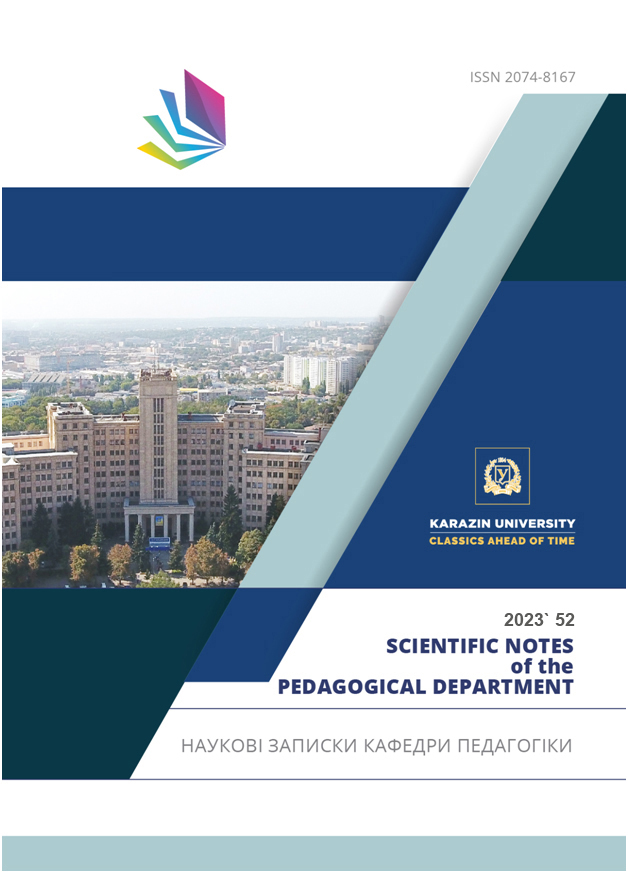Specific features of organization of intellectual education of children in preshool education institutions in the People`s Republic of China
Abstract
Preshool age is a favourable period for the formation of child`s initial knowledge about the surrounding world, laying the foundations for further enhanced intellectual learning. However, it is extremely important not to turn the educational process in preschool education institutions into a intensive intellectual upbringing in order to avoid intellectual overload of children, to promote the balanced development of children`s thinking, emotions and will, ensuring their harmonious development. In view of this it seems expedient to study the pecularities of intellectual education in different countries of the world, in particular in the People`s Republic of China, in order to highlight the positive attainments of the world educational practice regarding children`s education and development. The aim of the study is to reveal the specific features of organization of intellectual education of children in preschool education institutions in the People`s Republic of China.
Downloads
References
Bogush, A., Havrysh, N. (2017). Speech development of children of the fourth year of life: educational methodical
manual Kyiv: Genesis. [in Ukrainian].
Burkovska, O. (2010). Holistic approach to the development and education of the youngest. Preschool education, 6, 10-12. [in Ukrainian].
Vasylieva, S., Gavrish, N., Ragozina, V. (2021). Education of young children in preschool education institutions of different types: monograph /; Ed. by N. V. Gavrish. Kropyvnytskyi: IMEX – LTD [in Ukrainian].
Holovko, M., Mikheieva, O. (2019). Pedagogical support of preschool childhood: teaching. manual Sloviansk: DDPU [in Ukrainian].
Ivanenko,N.,Kozak,L.(2022). Pedagogical support of children of preschool age as a psychological and pedagogical problem. Perspectives and innovations of science. Series “Pedagogy”, Series “Psychology”, Series “Medicine”, 6, 173- 183. Retrieved from https://elibrary.kubg.edu.ua/id/eprint/41741/1/Ivanenko_Kozak.pdf [in Ukrainian].
Krutiy, K. (2010). Conceptual principles of psychological and pedagogical support: principles and techniques. Humanization of the educational process, 1, 185-198. [in Ukrainian].
Polovina, O. (2020). Art education today: a choice of approaches. Preschool education, 12, 3-8. [in Ukrainian].
Kuzmuk, L., et. al. (2013). We develop, teach, raise a child of the third year of life: method. manual / Ed. by T. Ponimanska. Kyiv: Slovo [in Ukrainian].
Savchyn, M. (2011). Age psychology: teaching manual. Kyiv: Akademvydav [in Ukrainian].
Saprykina, O. (2007). Methodology for the development of active speech of children of the third year of life in artistic and subject activities. PhD thesis, Luhansk Taras Shevchenko National Pedagogical University, Luhansk, Ukraine [in Ukrainian].
Smolnikova, G. (2018). Peculiarities of development of mental processes in young children. Teacher’s palette, 3,
-6. [in Ukrainian].
Stetsenko, T. (2020). Experiments in art: implementing STREAM education. Preschool education, 1, 20-23.
[in Ukrainian].
Telcharova, O. (2017). Pedagogy of early childhood: teaching methodical manual. Kharkiv: I. Ivanchenko
[in Ukrainian].
Ionova, O., Luparenko, S. (2022). Speciꢁic Features of Waldorf Preschool Pedagogy. Studies from Early Childhood Education 2022 (pp.60-62) / Ed. by Monika Miňová, Matej Slováček. Presov: OMEP.
孩子的早期教育能力胜于智力 [Children’s early education ability is better than intelligence]. Retrieved from
http://tlshun.com/zaixianketang/200810/13-33_2.html [in Chinese].
EducationalTeaching.教育教学,3,11[LuZhongchun. (2021). On the cultivation of children’s intelligence and good habits in preschool education. Educational Teaching, 3, 11]. Retrieved from https://cn.usp-pl.com/index.php/jyjx/article/viewFile/56081/55948 [in Chinese].
付娅.(2021).自然观察智力及其在幼儿园教育中的培养. 中国教工,4期[Fu Ya. (2021). Natural Observational Intelligence and Its Cultivation in Kindergarten Education. China Teachers, 4]. Retrieved from http://www. chinaqking.com/yc/2021/2973345.html [in Chinese].
曲欣. (2001).早期开发幼儿“复合智力.ChinaEducationandResearchNetwork[QuXin.(2001).Earlydevelopment of children’s “compound intelligence”. China Education and Research Network]. Retrieved from https://www.edu. cn/edu/xue_qian/xue_qian_yan_jiu/zhuan_ti/jia_ting/zhi_li/200603/t20060323_12406.shtml [in Chinese]. 19. 张晓艳. (2017). 幼儿园教育中关于幼儿自然观察智力的培养. 知识文库, 22, 65 [Zhang Xiaoyan. (2017). Cultivation of children’s natural observation intelligence in kindergarten education. Knowledge Library, 22, 65].
张金兰. (2019). 自然观察智力及其在幼儿园教育中的培养. 基础教育论坛, 17, 66-68 [Zhang Jinlan. (2019). Natural observation intelligence and its cultivation in kindergarten education. Basic Education Forum, 17, 66- 68]. [in Chinese].
杨碧君, 吴加奇. (2022). 以“非智力因素”衔接为抓手重构课程. 中国教育新闻网-中国教育报 [Yang Bijun, Wu Jiaqi. (2022). Curriculum reconstruction based on the connection of “non-intellectual factors”. China Education News Network-China Education News]. Retrieved from http://www.jyb.cn/rmtzgjyb/202205/ t20220522_694027.html [in Chinese

